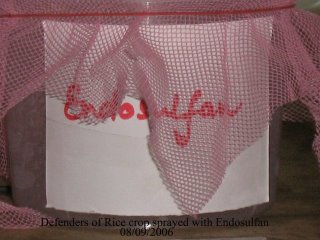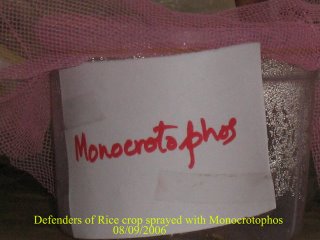Friday, September 22, 2006
Joint Director addressing MAO's
Friday, September 15, 2006
 The toxicity experiment was conducted to know the
The toxicity experiment was conducted to know thelevels of resistance or susceptibility to different
insecticides at different concentrations on defenders.
Known number of predators were released into different
polythene jars and sprayed with Monocrotophos 1.6 ml/lit of water,
Endosulfan 2 ml/lit,Carbendazim 1 g/lit and
Azadarichtin 1500 ppm 5ml/lit and observed the
toxicity of spray solutions at different intervals viz.
5 min,10 min 15 min and 20 min and inferred that
all types of predators like carabid,spiders,gryllid,
dragon flies,damsel flies and water striders are
highly susceptible to monocrotophos
( 100% mortality observed within
10 minutes) and survived upto 15 minutes in the
case of Endosulfan as it is Eco friendly and broad
spectrum.Defenders sprayed with fungicide and
neem are safe even after 24 hours.

 Mandal Agricultural Officers concluded that all the
Mandal Agricultural Officers concluded that all thepredators released are safe with fungicides and
botanical pesticides but they are very much
susceptible to chemecal pesticides

4th spell SLTP(TOF) 8th sept to 10th sept 2006
08.09.2006 Day I
------------------------
8.00 AM to 1.30 Pm
--------------------
Visit to TOF plot recording PAR observations
Collection of insects on paddy
Identification of collected insects
Charts preparation and presentation on PAR
2.15 PM to 5.30 PM
--------------------
Toxicity experiments
Guest Lecture on Rice Plant Physiology by Sri K.Vijay Kumar, Research Associate,ARS,Vizianagaram
Group Dynamics
Review of the days activities and next days planning
------------------------
8.00 AM to 1.30 Pm
--------------------
Visit to TOF plot recording PAR observations
Collection of insects on paddy
Identification of collected insects
Charts preparation and presentation on PAR
2.15 PM to 5.30 PM
--------------------
Toxicity experiments
Guest Lecture on Rice Plant Physiology by Sri K.Vijay Kumar, Research Associate,ARS,Vizianagaram
Group Dynamics
Review of the days activities and next days planning
Thursday, September 14, 2006
toxicity experiments
toxicity experiments
toxicity experiments
toxicity experiments
Pot cage studies 09/09/2006
 It is to study the biology and symptomtology of different
It is to study the biology and symptomtology of differentpests of Rice to have a clear systematic planning in managing
the pests.Wrapping polythene sheet around the paddy
plant in the pot with the help of bamboo sticks as shown
in the photo and small holes were made for aeration and
covered the top with muslin cloth.Three different types of
paddy pests like Leaf folder, Stem borer and short horned
grass hopper were collected and released seperately for
observation of damage symptoms.

Predation experiments 09/09/06
 Predation experiment is to know the host range
Predation experiment is to know the host rangeof different predators, to know the feeding potentiality
of different predators and to observe the time of feeding.
Different types of insects were collected by the MAO's
from the field and placed them in the jars in known
numbers(predators and pests) allow them to feed for
a period of 24 hrs.The observations were recorded to
know the feeding potentiality and host range.

2nd Day SLTP(TOF) for MAO's 09.09.2006
Day II 09/09/2006
----------------------
8.00 AM to 1.30 PM
---------------------
Visit to TOF plot at Vasadi village
AESA experiments
Collection of pests and Defenders on rice
Group Dynamics
Identification of insects
Charts preparation and presentation on AESA
2.15 PM to 5.30 PM
--------------------
Guest lecture on Identification of Pests and Defenders on Paddy by Maharajan,K.,Agril.Officer,Vizianagaram
Conducting predation experiments
Pot cage studies
Group Dynamics
Review of the days activities and next days planning
----------------------
8.00 AM to 1.30 PM
---------------------
Visit to TOF plot at Vasadi village
AESA experiments
Collection of pests and Defenders on rice
Group Dynamics
Identification of insects
Charts preparation and presentation on AESA
2.15 PM to 5.30 PM
--------------------
Guest lecture on Identification of Pests and Defenders on Paddy by Maharajan,K.,Agril.Officer,Vizianagaram
Conducting predation experiments
Pot cage studies
Group Dynamics
Review of the days activities and next days planning
 Highly colourful and makes circular webs in the rice canopy,
Highly colourful and makes circular webs in the rice canopy,on sunny days seek shelter under the leaf besides the web
and preys on adults and moths of rice pests

 Having Long legs ,commonly seen lying outstretched on a rice leaf and preys on
Having Long legs ,commonly seen lying outstretched on a rice leaf and preys onStem Borer and Leaf Folder moths,Leaf and Plant hoppers

3rd Day SLTP(TOF) for MAO's 10.09.2006
DAY III -Sunday 10/9/06
---------------------------
8.00 AM to 1.30 PM
---------------------
Practice polambadi
Collection and identification of pests and defenders on paddy
Group Dynamics
Charts preparation on pests and defenders identified
2.15 PM to 5.30 PM
--------------------
Food webs of Paddy leaf folder,Brown Plant Hopper and Stem Borer
Interaction with facilitators
Group Dynamics
Review of the days activities and next spell planning
---------------------------
8.00 AM to 1.30 PM
---------------------
Practice polambadi
Collection and identification of pests and defenders on paddy
Group Dynamics
Charts preparation on pests and defenders identified
2.15 PM to 5.30 PM
--------------------
Food webs of Paddy leaf folder,Brown Plant Hopper and Stem Borer
Interaction with facilitators
Group Dynamics
Review of the days activities and next spell planning
Sunday, September 03, 2006
PAR experiments and A E S A on 26th Aug 2006 by Farmer facilitators
 Farmer Facilitator Mr Rama rao of Bobbili mandal ,Vizianagaram,A.P.,India explaining P A R observations recorded by their group in the TOF plot to the other facilitators by way of chart.
Farmer Facilitator Mr Rama rao of Bobbili mandal ,Vizianagaram,A.P.,India explaining P A R observations recorded by their group in the TOF plot to the other facilitators by way of chart. 
 Farmer Facilitator Mr Balaram of R.B.Puram mandal
Farmer Facilitator Mr Balaram of R.B.Puram mandalof Vizianagaram,A.P.,India, presenting a chart
with datails on Agro Eco System Analysis
to the other facilitators


















